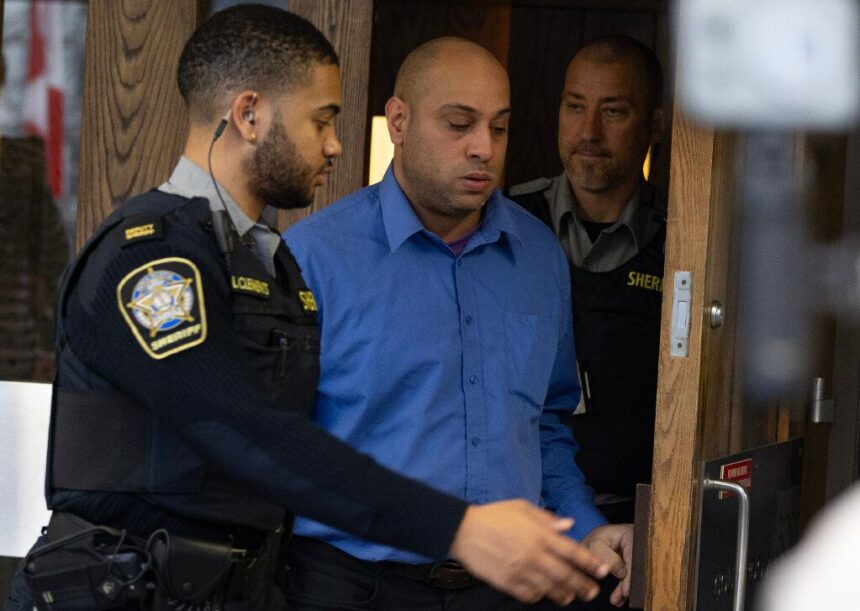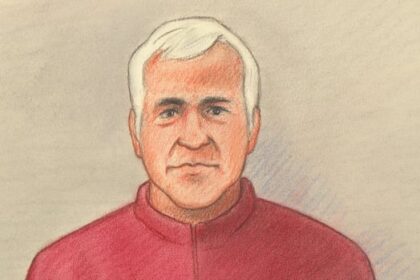Alexander Pishori Levy, 40, will be sentenced in Nova Scotia Supreme Court next AprilPublished Nov 26, 2025Last updated 24 minutes ago7 minute readFormer Halifax Alehouse bouncer Alexander Pishori Levy leaves Nova Scotia Supreme Court on Wednesday after a judge found him guilty on charges of manslaughter and criminal negligence causing the death of a bar patron in December 2022. Photo by Ryan TaplinArticle contentA former Halifax bouncer has been found guilty of two criminal offences in the death of a bar patron almost three years ago.THIS CONTENT IS RESERVED FOR SUBSCRIBERS ONLY.Subscribe now to access this story and more:Unlimited access to the website and appExclusive access to premium content, newsletters and podcastsFull access to the e-Edition app, an electronic replica of the print edition that you can share, download and comment onEnjoy insights and behind-the-scenes analysis from our award-winning journalistsSupport local journalists and the next generation of journalistsSUBSCRIBE TO UNLOCK MORE ARTICLES.Subscribe or sign in to your account to continue your reading experience.Unlimited access to the website and appExclusive access to premium content, newsletters and podcastsFull access to the e-Edition app, an electronic replica of the print edition that you can share, download and comment onEnjoy insights and behind-the-scenes analysis from our award-winning journalistsSupport local journalists and the next generation of journalistsRegister to unlock more articles.Create an account or sign in to continue your reading experience.Access additional stories every monthShare your thoughts and join the conversation in our commenting communityGet email updates from your favourite authorsSign In or Create an AccountorArticle contentAlexander Pishori Levy, 40, was accused of fatally choking Ryan Sawyer during an altercation outside the Halifax Alehouse on the morning of Dec. 24, 2022.Article contentArticle contentSawyer, 31, who was home from Ontario visiting family in the Halifax area for the holidays, was unconscious with no pulse when police responded to a 911 call from staff of the downtown bar at about 1:15 a.m.Article contentArticle contentHe was transported to hospital, where he was pronounced dead at about 7:50 a.m.Article contentLevy went on trial in Nova Scotia Supreme Court in Halifax last month on charges of manslaughter and criminal negligence causing death.Article contentThe Crown called evidence from 19 people, while Levy was the only defence witness.Article contentLawyers made closing submissions Oct. 20, and Justice James Chipman delivered his decision Wednesday, finding Levy guilty on both counts.Article content“On all the evidence, I find that Mr. Levy was overzealous and deployed a disproportionate, violent mechanism to subdue Ryan Sawyer and ultimately cause him to go into cardiac arrest and die,” Chipman said in a 66-page decision.Article content“What began as a rather minor disturbance inside the Alehouse quickly escalated, primarily owing to Mr. Levy’s disproportionate response. Rather than de-escalating the situation, Mr. Levy ramped things up and used extreme violence to ultimately subdue Ryan.”Article contentArticle content Family and friends of Ryan Sawyer embrace after former Halifax Alehouse bouncer Alexander Pishori Levy was found guilty Wednesday on charges of manslaughter and criminal negligence in Sawyer’s death in December 2022. Photo by Ryan TaplinArticle contentLevy, who was head of security at the Alehouse, testified that Sawyer and his brother Kyle were ordered to leave the bar after a dispute with another customer.Article contentHe said Kyle Sawyer threatened him on the way out of the building and that Ryan Sawyer rushed towards him outside the Prince Street entrance and said something to the effect of, “you want to see somebody freak out?”Article contentAfter Kyle Sawyer pushed Levy, another bouncer grabbed Kyle, and Levy punched and kicked him in the head before they wrestled on the street.Article contentLevy got up after another bouncer pinned Kyle Sawyer to the ground. Levy walked back to the door, called for more staff on his radio and asked a colleague to phone 911.Article contentThe accused said he then saw Ryan Sawyer engaged in a scuffle with another bouncer just down the sidewalk. He said that when he tried to restrain Sawyer, they fell to the ground together, with Sawyer’s back on his chest.Article contentHe said he put his arm around Sawyer’s neck in a move known as a rear naked chokehold, but Sawyer kept trying to punch and claw him in the face.Article contentLevy said he feared being overpowered so he applied more pressure with the chokehold to put Sawyer to sleep. He said he squeezed Sawyer for 10 to 15 seconds until he felt him pass out.Article contentLevy estimated he had used chokeholds “close to a hundred times” during his more than 16 years as a bouncer without ever seriously injuring anyone else.Article contentSecurity and cellphone videos entered into evidence at the trial show that Levy had Sawyer in the chokehold for about two minutes. But Levy insisted he was not actually squeezing Sawyer’s neck for most of that time and was only holding him until police arrived.Article contentIn closing arguments, defence lawyer James Giacomantonio said the Crown had not proven his client’s guilt beyond a reasonable doubt on either charge.Article contentArticle contentGiacomantonio said Levy was a credible witness whose evidence showed he was acting in defence of himself or others when he tried to take Sawyer to the ground and restrain him.Article content“The tragic death of Ryan Sawyer was not a foreseeable outcome,” the defence lawyer said. “It was a lightning strike. It’s a heart attack when you’re shovelling the driveway. … It’s not a culpable homicide.”Article contentGiacomantonio said his client’s response to the situation was “a reasonable, proportionate use of force, given what he knew, what he believed, and what he had previously done.”Article contentHe said that when police arrived and asked Levy “three or four times over a couple of seconds” to release Sawyer, he let go.Article contentProsecutor Rob Kennedy told the court Levy caused a “completely avoidable tragedy.”Article content“From the moment that he physically engaged with Kyle Sawyer outside of the Prince Street doors, his fuse was lit” Kennedy said of Levy. “He was ready to fight.Article contentArticle content“While Kyle Sawyer no doubt regrets shoving Alex Levy that morning, no one would have predicted or expected that an experienced bar security guard like Alex Levy would have applied a sustained chokehold on … Ryan, ending his life.”Article contentKennedy said Ryan Sawyer was “an unarmed, heavily intoxicated young man who at no point threatened … or assaulted Alex Levy before he was choked to death.Article content“(Levy’s) response to this physical interaction with Kyle and then with Ryan from start to finish went beyond any acceptable definition of proportionality and reasonableness. At every juncture, (his) actions escalated the situation into a more serious one.”Article contentKennedy questioned why Levy felt he had to physically engage with the Sawyers after they were escorted out of the bar.Article content“Alex Levy is not the warden of Prince Street,” he said. “He is not law enforcement.”Article contentHe said Levy’s purpose for restraining Ryan Sawyer was not to protect himself or a third party and took exception with the defence’s characterization that the chokehold was brief.Article contentKennedy said Levy’s evidence was “incredible and unreliable.” He asked the court to accept the evidence of Const. Jairus Lamphier, the first Halifax Regional Police officer to interact with Levy.Article contentThe officer said the bouncer continued to apply pressure to Sawyer’s neck even though he was limp and motionless.Article content“This begs the question, how much longer would Alex Levy have held on to Ryan’s neck if police hadn’t intervened?” Kennedy said.Article contentIn his decision Wednesday, Chipman said he did not believe the accused’s evidence in “virtually every critical area.”Article content“His testimony does nothing to leave me with a reasonable doubt,” the judge said. “Overall, … I am left to conclude that his evidence, taken together with all of the evidence, has convinced me beyond a reasonable doubt of his guilt of the charged crimes.”Article contentArticle contentThe judge said Levy’s direct evidence came across as “over-rehearsed, rather like he was attempting to give a perfect recollection, including precise time estimates, of various events.”Article contentChipman accepted Lamphier’s evidence that Levy was still applying pressure to Ryan’s neck when he arrived at the scene.Article content“On balance, I completely accept (the officer’s) recollection of events and outright reject Mr. Levy’s,” the judge said.Article contentThe evidence established that Levy applied a compression neck hold for close to two minutes, Chipman said.Article content“I find that this was a beyond-transient hold that was significant and dangerous such that it caused Ryan’s death,” he said.Article contentThe judge said the Crown proved beyond a reasonable doubt that Levy was not acting in self-defence when he applied the chokehold but was instead motivated by anger.Article content“I find that Mr. Levy lacked professionalism on the early morning in question,” Chipman said. “I say this having regard to the entirety of his behaviour with Ryan and Kyle, and especially when he chose to re-enter the fray and jump on Ryan’s back.Article contentArticle content“This was not at all warranted in the circumstances, where I find that Ryan had already been sufficiently subdued by (another bouncer).”Article contentLevy’s sentencing hearing is set for next April.Article contentOutside court, Giacomantonio said Levy received a fair trial but was obviously disappointed with the outcome.Article content“He’s in a reasonable state of shock,” the defence lawyer said of his client. “He’s just processing a very difficult moment in his life.”Article content Crown attorneys Melanie Perry and Rob Kennedy take questions from reporters Wednesday after a Nova Scotia Supreme Court judge found former Halifax Alehouse bouncer Alexander Pishori Levy, guilty on charges of manslaughter and criminal negligence causing the death of a bar patron in December 2022. Photo by Ryan TaplinArticle contentKennedy said the decision was “thorough and well-reasoned.”Article content“Justice Chipman canvassed every shred of evidence in this case to come to a conclusion that Mr. Levy was guilty beyond a reasonable doubt,” he said.Article contentKennedy’s co-counsel, Melanie Perry, said there are no winners in a case like this.Article content“Ryan Sawyer is not coming back,” Perry said. “It’s something his parents and his family are always going to have to deal with.”Article contentKennedy stressed that Lamphier’s evidence was crucial to the prosecution. “That allowed the court to really draw conclusions as to … what Mr. Levy was doing at the very end of the interaction,” he said.Article contentThe Crown attorneys said it’s too early to say what they will seek for a sentence.Article content“The range of sentence for manslaughter is quite broad,” Kennedy explained. “It can be from a non-custodial sentence to a federal term of imprisonment. It’s really fact-specific as to what the appropriate sentence would be.Article content Scott and Lee Sawyer comment on Wednesday’s Nova Scotia Supreme Court decision finding former Halifax Alehouse bouncer Alexander Pishori Levy guilty on charges of manslaughter and criminal negligence causing the death of their son Ryan in December 2022. Photo by Ryan TaplinArticle contentSawyer’s parents also spoke with reporters after the decision.Article content“We’re grateful that justice has been served,” said Lee Sawyer, the victim’s mother.Article content“We’ve lost a son, and we also had a son badly beaten up,” Scott Sawyer said. “We’re not going to have this moment, or what has happened to Ryan, define us going forward. We’re going to be strong for Ryan.”Article contentArticle contentRyan was “a kind soul” who was just trying to save his brother, Scott said.Article content“At one point at the door, you can see him reaching and trying to pull Kyle out of it,” he said. “When Kyle was on the ground, saying ‘I can’t breathe,’ Ryan was trying to get to him. … He died trying to save his brother.”Article contentLee said the case is a call to the provincial government to bring in regulations for the training of bar security staff.Article content“The incident with Ryan and Kyle wasn’t a one-off,” she said. “There were multiple incidents at the Alehouse prior to this, (and) this could have been prevented.Article content“For the premier to say that it’s not a problem in the province of Nova Scotia is a total disregard for (the) safety of the residents of Nova Scotia and a total disrespect to our family and to my son. I am going to continue to push forward until proper regulation is put in place.”Article content
Former Halifax bouncer found guilty of manslaughter, criminal negligence in chokehold death of bar patron










